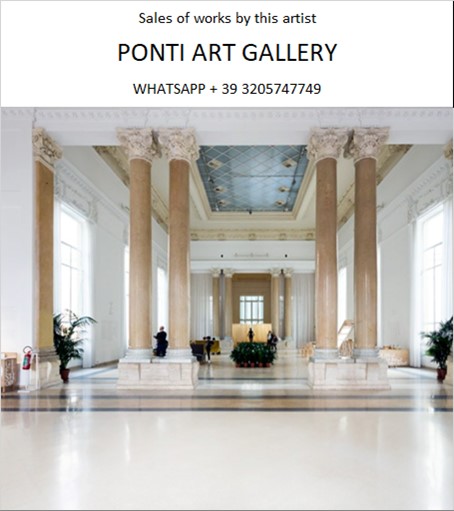Ponti Art Gallery is interested in buying and selling works
of art by this artist.

Willi Baumeister Biography
Willi Baumeister was a German painter, scenic designer, art professor, and typographer, born on January 22, 1889, in Stuttgart, Germany. His career spanned the first half of the 20th century, a period marked by significant upheavals and innovations in the art world. Baumeister's work is celebrated for its contribution to abstract art, and he remains a pivotal figure in the development of modern art in Germany and beyond.
Baumeister's early life was rooted in the craftsman tradition of his family. He began his formal education in the arts at the Stuttgart Art Academy in 1905 while still completing an apprenticeship as a decorative painter. This dual focus on craftsmanship and artistic innovation would characterize much of his later work. His time at the academy introduced him to influential figures such as Adolf Hölzel, Oskar Schlemmer, and Otto Meyer-Amden, who would become lifelong friends and collaborators.
In 1911, Baumeister made his first trip to Paris, a city that was then the epicenter of the avant-garde. This visit, and subsequent travels to Zurich, Amsterdam, London, and Paris again, exposed him to a wide range of artistic movements and styles, including Cubism and Neo-Impressionism. These experiences significantly influenced his early work, which began to move away from traditional forms towards abstraction.
Baumeister's career was interrupted by the First World War, during which he served in the Balkans and the Caucasus. After the war, he returned to Stuttgart and became a master student of Adolf Hölzel. He co-founded the Üecht Group Stuttgart and became a member of the Berlin Novembergruppe, marking the beginning of his active participation in the German avant-garde.
The 1920s were a period of significant artistic development for Baumeister. He was involved with several art movements, including Constructivism and Abstraction-Création, and his work began to gain international recognition. Baumeister's paintings from this period are characterized by their use of geometric shapes and a move towards non-representational forms. He also began to explore the use of materials such as sand and putty to create textured surfaces in his Mauerbilder (wall pictures).
Despite his growing reputation, Baumeister's career faced significant challenges with the rise of the Nazi regime. In 1933, he was dismissed from his teaching position at the Städelsche Kunstschule in Frankfurt due to the regime's policies against modern art, which they labeled "degenerate." His works were included in the infamous Degenerate Art Exhibition in 1937, and in 1941 he was banned from exhibiting his work. Despite these restrictions, Baumeister continued to paint in secret and studied prehistoric and Asian art, which influenced his later works.
After the Second World War, Baumeister's career experienced a resurgence. He was reinstated as a professor at the Kunstakademie in Stuttgart and became a leading figure in the abstract art movement in Germany. He co-founded the group ZEN 49, which sought to redefine art in the post-war era. Baumeister's work from this period is characterized by its exploration of form and color, drawing inspiration from prehistoric art and non-Western cultures.
Baumeister's contributions to art were not limited to his paintings. He was also an influential art theorist, and his treatise "Das Unbekannte in der Kunst" (The Unknown in Art), published in 1947, reflects his deep engagement with the philosophical underpinnings of abstraction. He continued to exhibit internationally and participated in several biennials and the first documenta in Kassel.
Willi Baumeister died on August 31, 1955, in Stuttgart, while working at his easel. His legacy is preserved through his extensive body of work, which includes paintings, stage designs, and typographic designs, as well as his contributions to art education and theory. Baumeister's art is held in numerous international museums, including the Tate Gallery in London, the Museum of Modern Art in New York, and the Museo Nacional Thyssen-Bornemisza in Madrid, ensuring that his influence on the art world continues to be felt.
Willi Baumeister Quotes and
Sales of Works
Ponti Art Gallery selects and deals with paintings by the
artist. Upon request, we provide free estimates and
evaluations, communicate prices, quotations, and current
market values.
If you are interested in BUYING or SELLING works by the
artist, contact us immediately.
If you wish to sell or receive an evaluation of the
works:
Send us a frontal photo of the painting, one of the back,
and one of the signature. Also, indicate the dimensions of
the work. Inform us about the purchase origin of the work
and any kind of available documentation (purchase
receipts, certificates of authenticity, publications). One
of our operators will respond to you on the same day. We
guarantee maximum confidentiality and extreme
professionalism.
If you wish to purchase works by the painter: Contact us
and let us know your request. We will inform you about the
available works. We also offer the possibility to
subscribe to our NEWSLETTER, through which you will be
informed at the beginning of each month about the latest
acquisitions of the art gallery.
You can send us pictures of the work:
